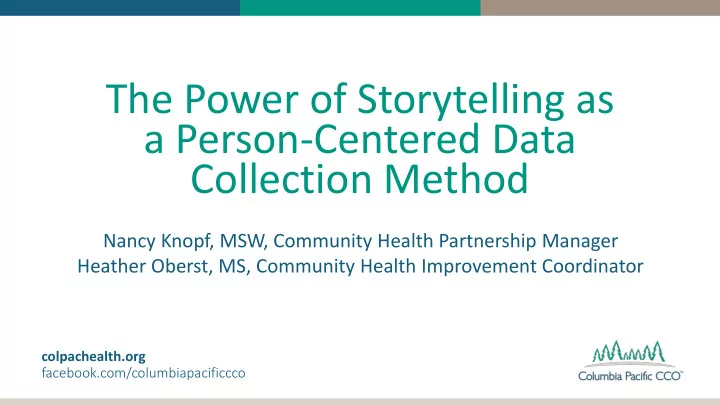

The Power of Storytelling as a Person-Centered Data Collection Method Nancy Knopf, MSW, Community Health Partnership Manager Heather Oberst, MS, Community Health Improvement Coordinator colpachealth.org facebook.com/columbiapacificcco
Traditional Assessments Assuming Mobilizing for Action through Planning and Partnerships (MAPP) Phase 1: Organizing Phase 2: Visioning Phase 3: The Four Assessments 1. Community Themes and Strengths Surveys/Photovoice/Interviews/Focus Groups 2. Systems Assessments 3. Community Health Status (aka Key Health Indicators) 4. Forces of Change Assessment Phase 4: Identify Strategic Issues Phase 5: Formulate Goals & Strategies Phase 6: Action Cycle Initiates colpachealth.org NACCHO, 2019
CCOs are Complex… The Cynefin Framework Complex Complicated Cause and Effect: Understandable Cause and Effect: Detectable, may in retrospect, but does not repeat have “educated expectations” Probe-Sense-Respond Sense-Analyze-Respond Disorder Chaotic Sim imple Cause and Effect: Not detectable Cause and Effect: Repeatable, perceivable, and predictable Act-Sense-Respond Sense-Categorize-Respond colpachealth.org Snowden, 2015 | page 3
What is Person-Centered Data? The community whose habits, opinions, and/or experiences are collected are also informing all phases of the design, development, and implementation of information gathering. The methods of collection are built to reflect the community’s interpretations of their experience rather than that of the collector. colpachealth.org
Why Person-Centered Data Matters • Supports translation from information to effective interventions. • Allows for weighting or uplifting voices that may otherwise be drowned out by the majority. • Allows respondents to also be champions, increasing trust of the results among the community. • Shows promise for addressing multiple levels of causality, which improves resulting decisions around intervention. • Supports the Oregon Health Authority’s vision as laid out in CCO 2.0 for capturing whether CCOs are meeting our intended purposes in addition to cost containment or metrics. colpachealth.org | page 5 Fiala & Landers, 2019.
Our Unique Approach • This form of Community Health Assessment is equity-oriented and trauma- informed. • The communities being surveyed were represented throughout the process and the gathered voices will continue to be at the table. • The complexity of their experiences was collected and respected. • As people told their stories, they coded their meanings rather than having a third party interpret their meanings for them. • The stories provided depth in the form of qualitative and quantitative data alike that will put member voice in our decision making processes. • Avoids reductive logic and allows nuance. • Uncovers many layers of experiences at the individual and community levels of analysis. colpachealth.org
Where It Fits In… Traditional Methods Person-Centered Data • • Can be simultaneously qualitative and Gives a longer-term view of healthcare and social determinants quantitative • Uniquely centers social determinants • Speaks to disease state and key community indicators such as • Accurately represents what would readiness or current state otherwise be mutually-exclusive • • Reduces interpretive bias Can be just as subjective but tends to be measured fairly consistently from • Can live beyond the survey-period year to year across time • Drives the way we look at traditional • Is less work even when they’re a lot data of work • Gives point-in-time views into community consciousness and values colpachealth.org | page 7
Survey Process Overview • Columbia Pacific CCO worked with a consultant from SenseMaker on preparing for survey creation and collection. • Story collection questions were developed wit ith Oregon Health Pla lan members as well as community and clinical partners. The resulting survey was then piloted both in English and Spanish. • 1,2 ,252 stories were collected by staff, members, clinicians, partners, and leadership from September 1-November 15, 2018. • Organized results were reviewed and “themed” by a variety of stakeholders— including a few members — who had been involved previously. • The data was foundational to our Regional Health Improvement Plan, and will continue to be used to inform both community and clinical improvement. colpachealth.org
The Instrument colpachealth.org | page 9
The Instrument colpachealth.org | page 10 10
Analysis • Statistical significance • Geographic means • Heat maps • Theming • Swim Lane Analysis colpachealth.org | page 11 11
Big Takeaways • • Housing, transportation, and It can be hard to get needs met food are needed but so are • People helping and community mental, spiritual, and emotional impact health supports • • People want to be treated as People need to be heard equals, and it affects health when • Flexibility and predictability are they aren’t needed — this is Trauma-Informed • Care Difficulties getting around was • the most cited barrier, but health People were united around strengths and barriers rather than insurance and rules as barriers divided by insurance or were also experienced demographics, though experiences were nuanced colpachealth.org
Now to Peek at the Data! colpachealth.org
Recommend
More recommend